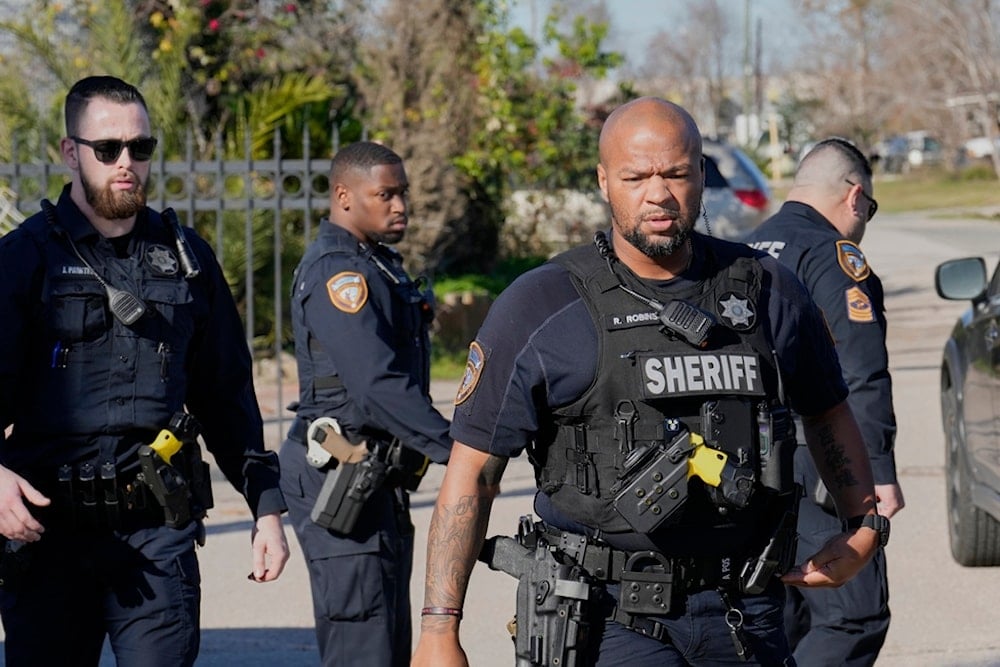Veterans tied to New Year's attacks spark extremism concerns
The FBI is investigating a possible connection between the two New Year’s attacks, as both vehicles were rented through the car-sharing service Turo.
-

Harris County Sheriff's officers clear the media from the neighborhood where 42-year-old Shamsud-Din Bahar Jabbar is believed to have lived, on Wednesday, January 1, 2025, in Houston, Texas. (AP)
The Intercept published a report on Friday discussing the two New Year's Day attacks that left 15 people dead and dozens injured, both carried out by individuals with US military backgrounds. The incidents have raised concerns about the growing connection between military service and extremist violence, with data pointing to an alarming rise in such cases over the past decade.
In New Orleans, 42-year-old Shamsud-Din Jabbar drove a pickup truck into a crowd of New Year's revelers on Bourbon Street, killing 15 people and injuring 35. The FBI identified Jabbar, a former US Army staff sergeant, as having served from 2007 to 2020, including a deployment to Afghanistan. President Joe Biden stated that Jabbar was "inspired by" ISIS and had expressed "a desire to kill" in videos posted online before the attack. The FBI is investigating whether others were involved.
A second attack occurred in Las Vegas, where 37-year-old Matthew Livelsberger detonated a Tesla Cybertruck outside a Trump hotel, killing himself and injuring seven bystanders. Livelsberger, a US Army Special Operations soldier, was still serving in the military but was on approved leave at the time. The FBI is probing whether the two attacks are connected, as both vehicles were rented using the same car-sharing service, Turo.
Military and Extremism
Data from a new report by the National Consortium for the Study of Terrorism and Responses to Terrorism (START) reveals a sharp rise in extremist crimes involving individuals with military backgrounds. From 1990 to 2010, an average of seven such cases occurred annually. Since 2011, this number has jumped to 45 per year.
According to the START research director, Michael Jensen, military service is the strongest individual predictor of becoming a "mass casualty offender," far exceeding factors like mental health issues or prior criminal history.
"Military personnel and veterans are not more likely to radicalize than the general public, but when they do, they may be more likely to plan or commit mass casualty crimes," Jensen's team concluded. START's database, which includes over 3,000 cases, shows that offenders with military backgrounds are 2.41 times more likely to commit mass casualty attacks.
Extremist affiliations
The report also sheds light on ideological motivations. Of the offenders with military ties, 73.5% were associated with far-right domestic extremist groups, while 15% were linked to foreign extremist groups like ISIS and Al-Qaeda.
Both Jabbar and Livelsberger had been stationed at Fort Liberty, formerly Fort Bragg, a large Army base with a history of soldier deaths, including drug overdoses and homicides.
While their assignments did not overlap, Fort Liberty has been under scrutiny due to preventable fatalities, with 109 soldiers dying there in 2020 and 2021 alone.
Read more: Extremism; a troubling trend for US military, Pentagon report shows
Joel A. Dvoskin, a clinical and forensic psychologist, urged caution in interpreting these findings, stressing the need for data to support beneficial changes.
"The Army is a vast organization with all kinds of different people and all kinds of different training and experiences," he said, noting that such information should be used to ease the transition from military to civilian life.

 3 Min Read
3 Min Read








